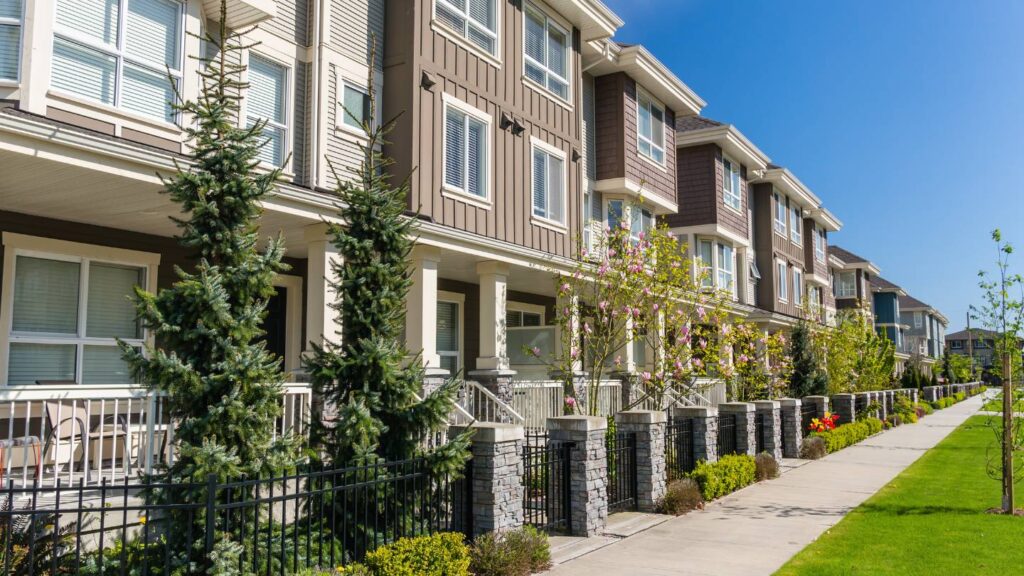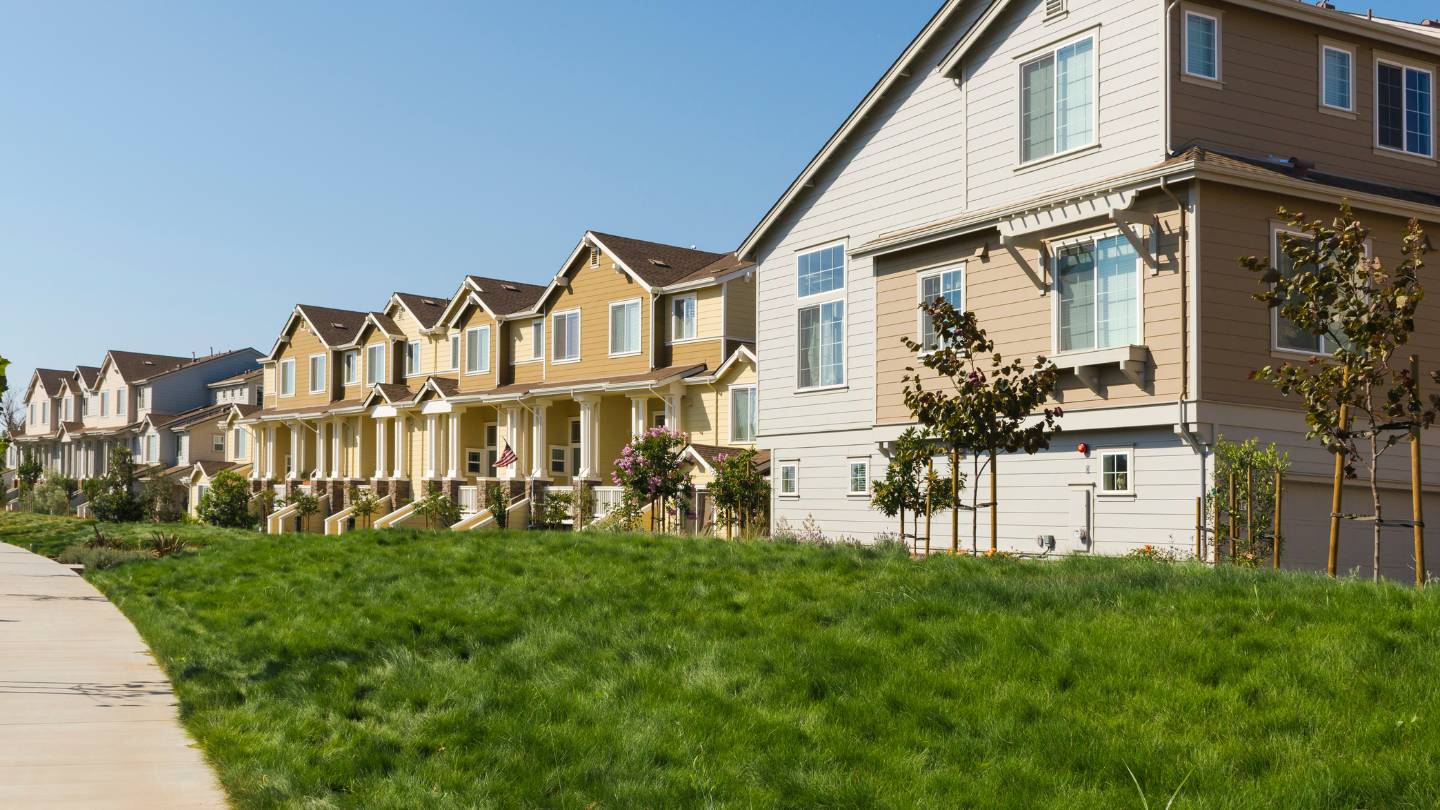Located between single-family homes and condominiums, townhouses offer a special combination of independence, open floor plans, and neighbourhood amenities. Buying a townhouse is an investment with long-term financial growth potential. Therefore, it's not just about the short-term gains.
Townhouse investments have several long-term rewards; this guide will help you navigate them all. Townhouses are dependable assets that may produce sustained returns over the years. They offer a constant stream of rental income, the possibility of property appreciation and equity accumulation, and more.
Furthermore, we shall investigate the adaptability and versatility of townhouses, accommodating a wide spectrum of tenants, including families, retirees, and young professionals. Appeals to a wide range of demographics boost rental property demand, giving investors a regular income.
Explore the benefits of townhouses, which are typically easier to manage and maintain than bigger residential properties regarding maintenance and upkeep. Investors seeking to maximise their wealth may find townhouse investments attractive due to the possibility of tax perks and incentives, which we will discuss in further detail below.
Townhouses: A Good Australian Investment?
Many Australians are struggling to buy affordable homes due to rising housing costs, especially for those on tight budgets. The ability to borrow money necessary to own traditional property has grown even more limited as interest rates keep increasing. This has led would-be market participants to seek alternative, increasingly appealing forms of real estate investment.
Since units usually have less land than houses, their capital growth is generally less. When dozens or even hundreds of unit owners live in a high-rise building, the land value of the building is shared by all of them.
How Is A Townhouse Characterised?
Individual dwelling units in a townhouse often share walls and are connected in a row. In contrast to the usual single-story apartment building, townhouses often have many stories and either a modest front or rear yard.
When you compare a townhouse to a unit, the main difference is that townhouses are single-family homes that are generally connected. In contrast, units are separate living spaces inside a larger building or complex.
What Are Townhouse Investment Benefits?
Accessibility in Price
The most desired neighbourhoods need financially to be in reality for many first-time homebuyers and investors. Townhouses are an option to get around this problem. Compared to single-family homes, townhouses are more cost-effective, making them a more accessible investment option in desirable neighbourhoods with good potential for appreciation.
Reduced Upkeep Expenses
A body corporate bodied with a townhouse, particularly if it was built recently. This differs from single-family homes, where you are personally responsible for all parts of the property and may only sometimes have the financial means to pay for repairs and maintenance.
Capital Gains That Are More Robust Than Units
Since townhouses often have a higher land-to-value ratio than units, they may experience more robust growth in the long run. Various aspects, including the abundance of space, seclusion, and outdoor spaces, influence townhouses' long-term appeal.
Better Rent Yield Than Homes
Another important thing to think about when getting an investment property is the expected rental yield. Townhouses usually have a higher rental yield than single-family homes because people want to live in them more, and they are more affordable.
In addition, townhouses are a great investment since they allow buyers to get a property in a great location, which means they may attract excellent tenants like young families and couples. A townhouse's many levels and bedrooms are two of its most appealing qualities, which can boost demand and rental income.
What Are Townhouse Investment Property Cons?
Always Lower Capital Gains Than Real Estate
To townhouses' dismay, single-family homes have maintained their unrivalled market dominance. Several variables, such as land size, housing supply, and market desirability, contribute to this. Nevertheless, this rule is far from universal, and other factors influence a property's potential for capital appreciation over time.
Parity in the Market
In some regions, particularly in suburbs still being developed, there may be an excess of townhouses for sale. Rather than the other way around, developers have a history of turning houses into townhouses. Due to this tendency, there may be an excess of townhouses, and many new developments have identical designs and aesthetics.
Because the real estate market is based on supply and demand, excess townhouses may cause rental demand to fall and capital appreciation to lag behind single-family homes.
Building Fees
A lot of townhouses today are part of a shared strata title. This means that the land and its upkeep are split between the townhouses next to each other. As part of this deal, you usually must follow some rules and pay a yearly fee to cover repairs and upkeep for the common places of the property.
Rent Yield Is Lower Than That of Units
A solid rental income can be your number one goal in the early stages of your property investment adventure if you're starting. Townhouse rent is likely lower than apartments and smaller units because of the higher initial investment required to own one.
Townhomes: What To Look For?
There are a few things to keep an eye out for when purchasing a townhome as an investment. By considering these aspects, you can arrive at the optimal choice.
Location
The location of your townhome is what will draw tenants in. It also helps determine if the house's market value will go up or down. Make sure to research the area when trying to find an excellent townhome to invest in.
Well Run Hoa's
It would help to learn about the HOAs in the neighbourhoods you want to buy in.
Will the HOA fees be used to keep the area nice? Are the comforts well taken care of? All of these things should be thought about when you're looking.
Ratios Of Renters To Owners
Look at the percentage of renters compared to homeowners in a given area.
Is everyone an owner? Do all renters live in the selected area? An indication of a property's desirability is the ratio of owners to tenants.
Why Townhouses Are Better?
Choosing to purchase your first home is no small feat. Homebuying decisions are complex; it's difficult to know where to begin. And what choices do we have? Houses and apartments are well-known; nevertheless, how about the ideal compromise? It is a townhouse, indeed. Townhouses, which combine the living quarters of a home with those of a more compact dwelling, are becoming increasingly popular.
Land Belongs To You
Townhouses are a great investment because you own the building itself and the land underneath it. Land appreciates at a far faster rate than apartments do on their own. There is always a need for newer apartment buildings, but more land must be available, particularly in desirable locations. Buying a townhouse is a great option to own a plot.
Community Feels
Good neighbours are essential for everyone. Residents of townhouse communities tend to have similar ideals and use the same area. Coexisting with those who share your values will ensure you never feel lonely.
Even if you're the loneliest person in the world, having a chatty neighbour next door might make you feel more at ease. Your personal space will be well-protected by the generous distances between the townhomes and the house-like walls. Everyone benefits from it.
Tenant Property Investment Strategies
Having a solid grasp of the property market and a large sum of money available upfront are usually prerequisites for investing in real estate. But that is beginning to change! A new wave of investors has emerged to try their hand at the rental property market, drawn in by the emergence of novel property investing ideas.
There are many options for getting your feet wet in real estate investing (without a tonne of money or a first home under your belt), such as reinvesting and dispersed investment groups.
Traditional Property Investment Strategies
Older, wealthier investors with plenty of expertise in purchasing properties have long dominated the property investing industry. Understanding where to put your money for real estate investment is crucial, as is having a large down payment ready to go. In terms of time-tested approaches to real estate investment, a few methods immediately come to mind:
- Most Australian investors use capital growth techniques, such as negative gearing, which means buying a property that costs more to run than it brings in, or "negative gearing."
- Cash flow techniques (e.g., positive gearing): On the other hand, if you want to know how to maximise your monthly profits over your usual expenses, a good cash flow plan is to buy an inexpensive investment property.
- The term "flip houses" refers to the practice of purchasing a home, making necessary repairs, and then selling it for a profit.
What do these ways of investing in real estate have in common? In all of these cases, an owner would need to have a deposit of several hundred thousand dollars saved up. If not, they would have to own a home already and use the equity to buy a new one.
Not to mention that a lot of money and risk is involved in these conventional approaches to investing in real estate. To be confident they're making a good investment, the investor should have a lot of expertise in purchasing properties.
Emerging Untraditional Property Investment Strategies
However, other, more conventional ways exist to get your real estate investing business off the ground. Two major approaches are developing that provide first-time investors with practical entry points to the market.
Rentvesting: What Is It?
Let me introduce you to reinvesting, a relatively new approach to real estate investing. As the name suggests, buying an investment property to rent it out (while continuing to rent themselves out) is the gist of this strategy.
Rising home prices have made it impossible for many first-time buyers to afford the home of their dreams. They will keep renting the house of their dreams in the neighbourhood of their choice and instead buy a cheap house that can be renovated into an investment property.
Pros And Cons Of Rentvesting
Enter the Real Estate Market Quickly:
Many would-be homebuyers might avoid waiting years—or even decades—to put up a sizable down payment by purchasing less expensive residences.
Maintain Your Desired Way of Life:
Also, these investors can keep living in the house of their dreams and be near everything that matters to them for now.
Grow Your Nett Worth and Equity:
When you reinvest, you live in the kind of property you want in the area you want, plus you generate money from rentals, so you're essentially developing equity in a property.
Get Your Taxes Reduced:
If you use negative gearing, buying an investment property can save you money on taxes. In essence, you can deduct property expenditures from your taxable rental revenue.
Rentvesting is a viable property investing technique, but it has its caveats. First, you must continue to reside in a rented home as a renter.
Conclusion
Australia's townhouses are a popular choice for investors because of their independence, spacious floor designs, and access to community facilities. They provide consistent annual returns, steady rental income, capital growth, and equity building.
The demand for rental properties is increased by townhouses since they are rented by a diverse range of renters, such as young professionals, seniors, and families. Townhouse investments may appeal to wealth-seeking individuals because of tax advantages and incentives, and they are simpler to maintain and manage than bigger residential properties.
Due to limited credit options and escalating property costs, townhouses are a wise investment in Australia. Townhouses are more affordable and provide accessibility in upscale districts with appreciation potential. In addition, they offer better rent yield than houses, lower maintenance costs, and larger capital gains than apartments. Townhouses do, however, have certain drawbacks, including market parity, lower rent return than apartments, lesser capital gains than real estate, and building costs.
When investing in a townhome, take into account elements like location, which will draw renters and affect the house's market value. When looking to purchase a quality townhome, thorough research on the neighbourhood is essential. All things considered, townhouses are an excellent option for individuals who want to optimise their money and offer long-term financial growth potential.
Due to its ability to combine the living spaces of a home with a smaller footprint, townhouses are growing in popularity. Because you own the structure plus the ground underlying it, which appreciates more quickly than apartments do on their own, they are an excellent investment. In townhouse communities, having good neighbours is crucial for everyone because they share common values and use the same area.
With a new wave of investors entering the rental property market, tenant property investing techniques are evolving. Conventional methods for investing in real estate include "flip houses," which need a substantial down payment and real estate knowledge, and capital growth tactics like negative gearing and positive gearing.
Reinvesting and scattered investment groups are two emerging non-traditional property investment techniques. A relatively new method of real estate investing called rentvesting offers do-it-yourself opportunities for first-time investors to get their foot in the door.
They can swiftly enter the real estate market, keep up their preferred lifestyle, increase their equity and nett worth, and have their taxes lowered. Nevertheless, there are disadvantages to rentvesting because it requires them to keep living as tenants in a rented property.
Content Summary
- Townhouses offer a unique blend of independence and community, positioned between single-family homes and condominiums.
- Investing in a townhouse presents long-term financial growth opportunities.
- They are reliable assets, providing sustained returns and potential for rental income and property appreciation.
- Townhouses appeal to a wide range of tenants, enhancing rental demand and stability.
- They are generally easier to manage and maintain than larger residential properties.
- Investors in townhouses can benefit from tax incentives and financial perks.
- Rising housing costs in Australia make townhouses an attractive alternative investment.
- Townhouses typically have a higher land-to-value ratio than units, influencing capital growth.
- They are characterised by shared walls, multiple stories, and often a small yard.
- Compared to units, townhouses offer more privacy and space.
- Townhouses provide an affordable entry into sought-after neighbourhoods.
- They often come with lower maintenance costs due to shared responsibilities.
- Townhouses can show stronger capital gains than units, thanks to their land component.
- They usually offer better rental yields than single-family homes.
- However, townhouses may have lower capital gains compared to detached homes.
- Market saturation in certain areas can affect the desirability and value of townhouses.
- Shared strata titles can mean annual fees and communal rules.
- Rental yields of townhouses can be lower than smaller units or apartments.
- When investing in townhouses, location is a key factor for attracting tenants.
- Understanding the Homeowners Association (HOA) dynamics is crucial.
- The ratio of renters to owners in the area can indicate a property’s attractiveness.
- Townhouses offer the advantage of land ownership, unlike most apartments.
- They often foster a strong community feel among residents.
- Emerging investment strategies are making property investment more accessible.
- Traditional property investment often requires significant upfront capital.
- Strategies like negative gearing and house flipping are common but risky.
- Unconventional strategies provide new pathways into real estate investment.
- Rentvesting allows investors to rent their ideal home while owning an investment property.
- Rentvesting enables quicker entry into the property market.
- This strategy allows investors to maintain their desired lifestyle while building equity.
- Negative gearing in rentvesting can offer tax benefits.
- However, rentvesting requires continuing to live in rental accommodation.
- Understanding both traditional and emerging investment strategies is important for success.
- Assessing a townhouse's potential requires thorough market and location research.
- Townhouses can be a smart investment in high-demand urban areas.
- The layout and design of a townhouse can significantly affect its rental appeal.
- Being aware of market trends and demographic shifts is crucial for townhouse investors.
- Investors must consider the balance of capital gains and rental yields.
- It's important to factor in ongoing costs like strata fees and maintenance.
- Prospective investors should be mindful of the potential for oversupply in certain markets.
- Investing in townhouses can diversify an investor’s property portfolio.
- Townhouses often provide a middle ground between affordability and desirable features.
- The financial benefits of townhouse investment can be long-term and steady.
- Rentvesting offers an innovative approach for new investors in the property market.
- Townhouse investments can cater to a diverse range of tenant needs.
- They provide an opportunity to invest in property with less initial financial outlay than houses.
- The appeal of townhouses is partly due to their mix of private and communal spaces.
- Investors need to consider the potential for capital appreciation and rental income.
- Townhouses offer a balance of personal space and community amenities.
- Investing in townhouses can be a strategic move for those seeking a blend of lifestyle and investment benefits.
Frequently Asked Questions
Interest rate fluctuations can affect financing costs and overall returns on townhouse investments. Monitoring interest rate trends is essential for long-term planning.
Desirable features like modern appliances, energy efficiency, and proximity to amenities and public transportation can enhance townhouses' long-term appeal and value.
A stable and growing local job market often translates to increased demand for housing, positively influencing the long-term success of townhouse investments.
Flexibility is key. Investors should be prepared to adjust their strategy based on economic conditions, interest rates, and shifts in the real estate market to ensure long-term success.
Yes, working with a knowledgeable real estate professional can provide valuable insights, market analysis, and assistance in navigating the complexities of townhouse investments for long-term benefits.




